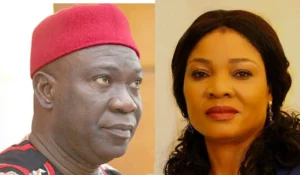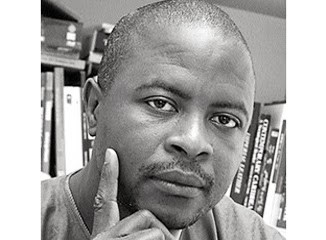By Onwubiko Agozino
The prosecutor, in the case of the Ekweremadus, opened on February 6, 2023 by saying that the donor must have been coached to call the defendants, cousins, uncles and aunties. Is that all they have got after more than 200 days in detention?
It is completely normal for all younger people to call all older people uncles, aunties, daddies and mamas; and call one another brothers, sisters, cousins, in Africa and in the African Diaspora.
The prosecutor should be forgiven for not knowing this basic cultural fact after months in detention but the lack of this awareness does not count against the defendants. In any case, being called a cousin, uncle, aunt, daddy, or mommy is not an evidence of deception or criminal conspiracy in either England and Wales, or anywhere else.

Testifying on 02/27/23, Dr. Obeta admitted to his defense attorney that he traveled from Nigeria with his own kidney donor in 2021. He apologised for saying that they were cousins when they were no blood relations. He desperately needed a donor, he said. It is still not a criminal offense to call someone a cousin or son. He said that he treats his donor as a son now and keeps in touch with him.
Anyone who believes that two African brothers are not related by blood should go ahead and prove the null hypothesis. We are all related by blood, actually. That is why the law does not require blood relationship to qualify as an altruistic donor.
The prosecutor also said that the defendants had money and power but that justice cannot be bought. That is prejudicial and should be withdrawn by the prosecutor or the jury should be instructed by the judge to disregard it. In the eyes of the law, the defendants remain innocent until proven guilty. The burden of proof is on the prosecution.
The claim that the doctor himself had received a kidney donation recently in the UK and that his donor allegedly recruited the unnamed donor for the Ekweremadus does not prove the defendants guilty of the perfectly legal procedure of organ donation under UK law. Even the prosecutor admitted that any family would do what they could to save a daughter that the prosecutor said had a deteriorating kidney disease.
Hence the prosecution avoided charging a case under the organ donation law and chose to charge the defendants with the violation of the understandably more severe modern slavery act.
The evidence being simply that they bought clothes for the young man (for a colder climate) and gave him pocket money that the prosecutor admitted was small but was a lot of money in Nigeria. Is that all the evidence the prosecution has after all the delays and detention without bail?
The Defense Attorney countered the allegations of the prosecution on 02/08/23 as follows:
“In Nigerian society there is an expression ‘everyone is each other’s keeper’ and the altruistic donation of organs is not regarded there as such a rare event as it is in this country.
“He will also say he was told (the donor) had offered to altruistically donate a kidney to Sonia.
“He denies he put directly or indirectly any reward to (the donor) or offered to do so and throughout he believed (the donor) was content to do so without reward.”
The prosecution engaged in misconduct on Thursday, 2/16/23, by abusing the enormous powers of search and seizure by the Crown in violation of the privacy rights of the defendants.
Apparently having no case against the defendants, the prosecution stooped low by trying to use text messages between a father and his daughters on Fathers Day against the father and against one of the daughters who was critically ill. Inadmissible in a criminal court and litigatatable in a civil court.
It is clear to anyone who can read reports of the closing arguments of the prosecution that what the daughters asked for in their Fathers Day messages was not more money but more time with their busy father and the father understandably promised to spare no expenses (of time) with them. What kind of father would answer otherwise?
The parents arrived London on June 23, 2022, two days after those texts, to spend more time with the children and they were promptly arrested, proclaimed the prosecutor.
Why did the prosecution try to use those very private and absolutely lawful expressions of love between an African man and his daughters on Fathers Day against the father, the mother, and against their critically ill daughter who needed care, not biased prosecution?
Was that all the ‘evidence’ the prosecution had against the defendants for which they detained the father and mother without bail for hundreds of days and counting (in the case of the father), and even during Christmas, Kwanzaas, and New Year celebrations? No case to answer.
Testifying on 2/20/23, the alleged victim said that it was Dr. Obeta who gave him money to travel and that when he went to the London hospital for tests, it was the first time he heard of kidney donation and the first time he heard the name, Ekweremadu. No evidence against Ekweremadu in his testimony. No case submission.
The alleged victim testified that he was told to lie that he and Sonia were cousins to facilitate the organ transplant. Was he told to lie about anything else? The defense counsel for Obeta reminded the court that he had lied about his age to the police to make him look more vulnerable, he also lied that both his parents were dead when they were still alive, and he lied about living on the street when he shared a room with two others in Lagos.
Whether he was a reliable witness or not, he should be given leave to remain in the UK indefinitely after being used by the Crown to try and criminalise the innocent. Case closed.
On March 6, 2023, the Distinguished Senator from Nigeria, Dr. Ike Ekweremadu, testified that he paid the expenses of Dr. Obeta who undertook to find a donor for his daughter, having found one for himself in 2021.
Ekweremadu insisted that he made it clear that the kidney donation must abide by the law, the donor must not be paid or coerced and must be willing to act altruistically, he told his brother who was a class mate of Dr. Obeta. He was hopeful that such an altruistic donor could be found in Nigeria because of the compassionate nature of the society.
On March 7, Ekweremadu told the court that he was afraid that people were trying to take advantage of his family but he continued the process for the sake of the life of his daughter.
On March 9, the prosecutor cross-examined Senator Ekweremadu on why he did not get a donor from his family and alleged that he must have preferred to buy one from someone less fortunate. But the defendant said that it was not true, he simply followed the advice of the more knowledgeable doctors.
Obviously, a family with a history of kidney disease is better off looking for a donor outside the family. In any case, it is not a crime to accept an altruistic donor from outside the family and the law never stipulated that the donor must be a family member. No crime has been proven in the case of Crown v. Ekweremadu
Now to the civil courts for hefty damages against the Crown Prosecution Service for the defendants.
Dr. Onwubiko Agozino, Professor of Sociology and Africana Studies, Virginia Tech is the author of Black Women and the Criminal Justice System; and of Counter-Colonial Criminology.

